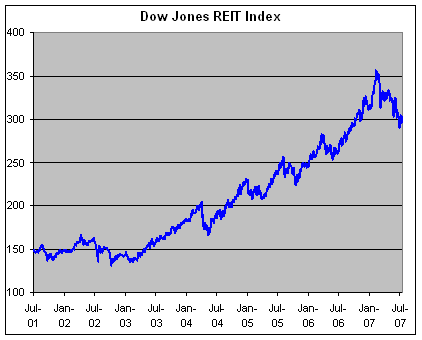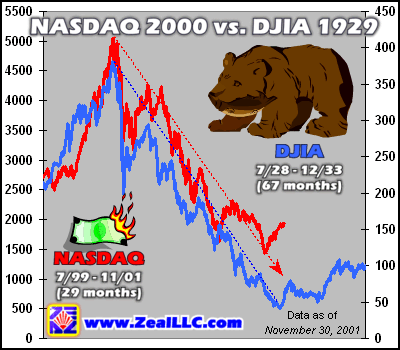There was an excellent diary by
New Deal democrat up at DKos just as the blood-letting got started yesterday morning.
http://www.dailykos.com/story/2007/9/7/84434/35396What now spooks many is the prospect that the Dow's dizzying rise of about 2000 points since mid-March, an erection that has no particular connection to the health of the underlying economy, and it's subsequent retreat, may be the last stage before a massive sell-off in U.S. equities markets.
One of NDd's many interesting points concerned the buzz at the Federal Reserve made by Edward Leamer, an UCLA economist.
Leamer demonstrated that almost every recession since the end of World War II has been preceded by a slowdown in housing construction and secondarily in major consumer purchases like cars.
By Leamer's criteria, this country is headed straight down into the steepest recession in a half century. What really makes Leamer's paper stand out is that he says this is happening despite massive, escalating defense spending.
Something is sucking the U.S. economy down into a pool of debt. The "cure" is killing the patient.
***

Yesterday's 250 point selloff on the Dow was sparked by a perfectly dismal jobs report. There were fewer jobs in August than those counted the month before, the first actual decline in four years. By the end of the trading day, the Dow had lost almost 2 percent, down to 13,113, making the total market losses about seven percent off the mid-July peak of 14,021. The downturn reflects a spreading awarness about record foreclosures and that some underwriters for corporate bonds are encountering problems raising cash. It also reflects an emerging consensus about a wider debt crisis that isn't restricted to sub-prime mortgage lending.
A Crash of the Dow, or Just a Bear Market, Could Lead to a Severe Recession Considering the very sick state of most of the rest of the US economy, it is not inconceivable that the Dow Jones Industrial Index could fall another 30 percent to around 9750 in the coming year. That would return the market to where it was two years ago.
http://bigcharts.marketwatch.com/quickchart/quickchart.asp?symb=djia&sid=1643&o_symb=djia&freq=1&time=9That may seem a dire prediction, but it's still a bullish outlook considering what happened to the Nikkei Stock Index after the Tokyo land bubble burst in 1990. If we experience anything of the same magnitude of loss, the Dow would fall to about 4000. If the Dow were to lose as much value as the NASDAQ did seven years ago, the value of Blue Chips would be about one-third of their current values.
Seen through the eyes of a stock analyst, the present shape of the Dow, particularly its Real Estate Investment Trust (REIT) index, has the classic "head and shoulders" that preceeded the collapse of the Tokyo Nikkei stock index in 1990 and the Dow in 1929.


The Nikkei crash followed a blowout in the Japanese real estate bubble, also an eerie parallel with what has happened to overinflated real estate in many areas of the U.S.

As the real estate market overheated, Japanese speculators shifted their money out of overleveraged commercial and residential holdings into stocks, but that market toppled when the central bank decided to raise interest rates to prevent a new wave of inflation. See,
http://www.cepr.net/index.php?option=com_content&task=view&id=608&Itemid=45The Nikkei lost fully half its value in just a few months, and eventually shed fully 75 percent of its value, and stayed depressed for 15 years, dropping from a peak of 40,000 to less than 10,000.
As we seen above, the shape and duration of the 1929 Great Crash was virtually identical to the Nikkei crash in '90. The more recent 1997 Asia crisis saw a similar cascading collapse of national currencies and equity markets in a number of countries from Russia to Thailand across the Pacific to the Philippines.
http://www.imf.org/external/pubs/ft/fandd/1998/06/imfstaff.htm. The 2000 NASDAQ crash that followed, shows the same classical formation:

A collapse of the Dow, even if not as severe as these other "great crashes" could easily result in an extremely severe recession. As Mark Wesibrot of the Center for Economic and Policy Research explains:
http://www.cepr.net/index.php?option=com_content&task=view&id=608&Itemid=45 The collapse of the stock market bubble caused a recession in 2001, followed by a jobless recovery of unprecedented weakness in the labor market. We are still experiencing the fallout, including the aftermath of a corporate crime wave currently working its way through the courts. Millions lost much of their retirement savings; the government's latest household survey of employment reported last week showed that people over 55 accounted for an incredible 103 percent of jobs gained over the last year.
Economists at the International Monetary Fund -- which to its credit has been warning about our housing bubble for some time -- have estimated that its collapse could have as much as twice the negative impact on the U.S. economy as did the stock market crash in 2000-2002.
As the blowout of the NASDAQ in 2000 showed, if U.S. equities markets are primed to collapse, they will, and true crashes tend to follow a classic profile for bubble markets, as did the dot.com blowout.


Trading curbs would just spread out the process, but true crashes follow the same dynamics. Liquidity problems, of the type that are appearing in the NY money markets, are a common factor that accompanies all really serious market drops.
The Fed can drop rates again and again, but if nobody wants to trade cash for equities, American investors might as well buy mattress futures.
Worse, if we follow Leamer's reasoning, the cure for the stock market's woes is more defense spending, which to be proportional would require the biggest American war in a half-century.
Dangerous times, indeed.
Also available in orange:
http://www.dailykos.com/story/2007/9/7/17632/96361________________________________
2007, Mark G. Levey